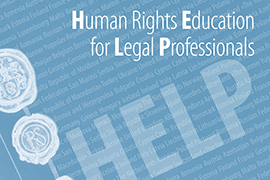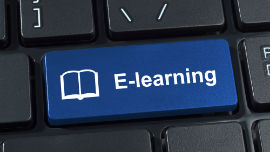Training
Purpose
HELP supports the Council of Europe member states in implementing the ECHR at the national level, in accordance with the Committee of Ministers Recommendation (2004) 4.
Over the years, HELP has become the main vehicle for all legal training activities pursued by the CoE.
HELP’s purpose is to enhance the capacity of judges, lawyers and prosecutors in all 47 member states to apply the ECHR in their daily work. Indeed, legal professionals, who are at the forefront of the protection of human rights, including those of victims, must benefit from high-quality training. This is to ensure that they are kept up-to-date with the ever-evolving standards and case law of the European Court of Human Rights.
In a world where technology is evolving rapidly and where people are always looking for fast and easy access to information, e-learning seems to be an optimal solution to approach training. Of course, this cannot replace traditional face-to-face training in all situations but can be complementary to it. E-learning can in some cases work as stand-alone, but it can also be used as a tool for a blended-learning approach. This is what HELP offers with its e-learning platform, where a wide range of training resources on the ECHR, developed and collected under the HELP Programme, is available on-line, translated into the national languages of the beneficiary countries.
There are two main types of HELP training resources:
- Distance-learning courses are available for selected groups of legal professionals participating in pilot courses moderated by certified national tutors (see list on the website). The list of available courses (including a description) is available in the catalogue of courses.
- Self-learning resources are available to any user who has an account on the platform. They include training manuals on both ECHR Methodology and Key Concepts, as well as Handbooks, standard curricula, course outlines, presentations, case studies, and e-learning courses on the different Articles and themes of the ECHR.
It is becoming a real challenge for legal professionals to follow the case law of the Strasbourg Court, which evolves quickly and expansively. The HELP Programme is also a platform where they will be able to keep abreast of Strasbourg case law developments through easy available updates. Self-learning resources are available, on various topics linked to the ECHR.
HELP conducts training of trainers sessions, in order to ensure high quality and harmonised HELP distance, blended and face-to-face courses by providing the HELP trainers with relevant training on the HELP methodology and the HELP e-learning platform. A list of HELP certified trainers is available on this website.
HELP developed a guidebook on training methodology, which will be published shortly. A number of resources on training of trainers are available on the platform in various languages.
Why HELP training?
The HELP methodology and its use of e-learning takes into account the heavy time pressure imposed on legal professionals in their daily work. Its added value is that curricula are drafted on a tailor-made basis, meeting participants’ specific training needs and learning pace, allowing flexibility. The HELP methodology and resources are systematically used in all CoE capacity building activities on the ECHR, organised in the Member States, including within the framework of EU/CoE Joint Programmes.
The use of e-learning also constitutes a cost-effective way to reach as many legal professionals as possible across as many member states as possible.
Technology:
- widens access to training;
- encourages learner participation;
- helps develop lifelong, autonomous learning;
- uses a range of resources through which to enhance student learning; and
- recognises where technology can enhance learning and teaching




